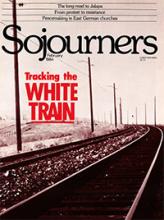As the last notes of the peace canon drifted up into the spires of the cathedral, 150 East German young people moved quickly into small discussion groups. A few found chairs, but most sat perched on the 400-year-old pews.
Our small group immediately began talking about the pending deployment of the new U.S. missiles in West Germany. "If the missiles are only 12 minutes from Moscow, what does that mean for us?" asked one young man. Another student complained to the group that he could not understand why the government said that missiles in the West were evil, but Soviet missiles to be deployed in the forest nearby were "peaceful."
This event was one of hundreds that took place throughout the German Democratic Republic (GDR) during the churches' annual peace week, or "Ten Days for Peace," November 6 to 16, 1983. For the last four years, the Federation of Protestant Churches in the GDR has set aside this time for education, dialogue, and reflection on peace issues in local congregations. We participated as part of a delegation of international observers from the West, including the National Council of Churches in the United States, whom we represented, plus churches in Great Britain, Italy, and Holland. We listened to people of all ages express their deepest feelings of anxiety, fear, resignation, and hope.
These emotions were not surprising. The West German parliament was about to give its approval to the deployment of cruise and Pershing II missiles, and from Britain and Italy came reports that components for the new missiles had already arrived. In Geneva, the negotiations were stalled and on the verge of total collapse. And in the GDR, the government had recently announced that if missiles were stationed in the West, the Warsaw Pact would respond by stationing new Soviet SS-22 and SS-23 short-range missiles on East German soil.
Read the Full Article

